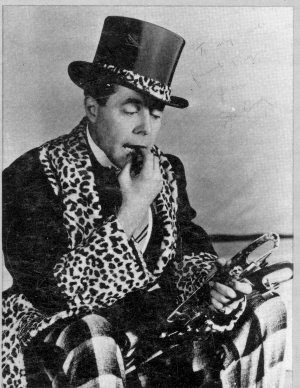
Joe Cook in "It Happens on Ice" circa 1940 |
Page 34 Spring 1986
|
All
our Yesterdays JOE
COOK, EPITOME OF ONE-MAN VARIETY by Roger Montandon
The
names of W.C. Fields, Fred Allen, Jimmy Savo and Joe Cook remind us
that juggling can be a springboard to further success in
entertainment. All of the above started as jugglers in vaudeville and
went on to become more famous in musical comedies, radio, film or
television.
Joe
Cook was born in Evansville, Indiana, in 1890. His real name was
Joseph Lopez and he took the name of Cook from the family that raised
him after the death of his parents. He first worked with his brother
in an act called "The Juggling Kids." As a single, he
appeared at Proctor's 125th Street Theater in July 1907.
But
he quickly began to expand his talents and entertain with a broader
range of skills. A 1909 advertisement reads, "Master of all
trades. Introducing in a 15-minute act, juggling, unicycling, magic,
hand balancing, ragtime piano and violin playing, dancing, globe
rolling, wire-walking, talking and cartooning. Something original in
each line - Some Entertainment. "
Finding
out the details of the juggling part of his "one man vaudeville
show" requires some research. In books covering vaudeville, Joe
Cook's zany props and his comedy monologs are covered in some detail
with just a mention of his early juggling career. But it is covered in
the following review by magician Clinton Burgess in "The
Sphinx" magic magazine, January 1922. Cook was appearing at the
Palace Theatre on January 2, 1922. Most of the review is about Cook's
magic burlesque, but here is the part covering his juggling: "...
From this he worked into club juggling, juggling five Indian clubs
in two hands, then three in two hands. two in one hand; with heel of
foot kicks up one club from
floor to hands and juggles with others; repeats with two clubs from
floor to hands, closing with five club juggling. This concluded the
magical and novelty work in his act, but in that of the Alexander Brothers
and Evelyn, ball bouncers which followed, Cook was continuously in
evidence - "rope spinning, " using a solid
The
city of Evansville thought so highly of his accomplishments that in
1931 it erected a monument to
him. It still stands at the corner of Fourth and Oak Streets on the
grounds of Welborn Hospital, protected from vandals by a chain-link
fence topped with barbed wire. The bronze plaque features a full-face
bas-relief of Joe himself. In the lower right corner a man lies on his
back juggling clubs with his hands and a barrel with his feet.
In
1942 Joe Cook was stricken with Parkinson's disease. In 1954 his wife,
Alice Cook, ordered six juggling balls and wrote, "As Joe is
going to be 65 this March 29 I would like to surprise him with six new
balls to work with. Despite his Parkinsons and the fact that he has
trouble even handling his food alone, believe it or not, he can still
juggle the balls."
Joe
Cook died in Staatsburg, New York on Mary 16, 1959. |

Joe Cook in "It Happens on Ice" circa 1940 |